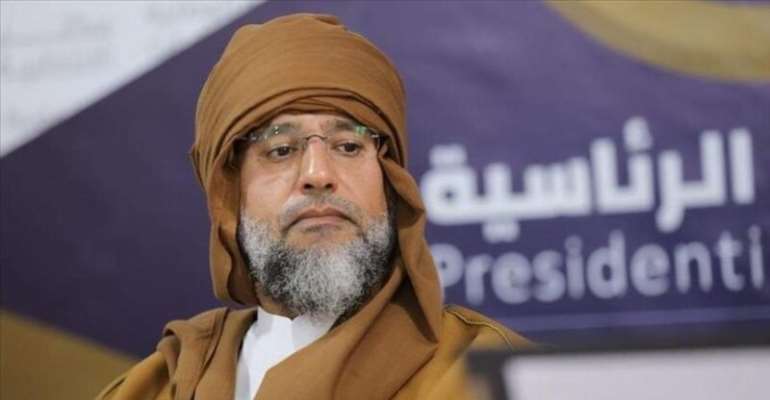Gadhafi’s Son Shakes Up Libyan Elections As Presidential Candidate

Saif al-Islam Gadhafi, the second son of late leader Moammar Gadhafi and once heir, will run in Libya’s Dec. 24, 2021 presidential elections. The High National Election Commission (HNEC) objected to his application, but a court in the southern city of Sabha reinstated him on 2nd December, 2021, rejecting the appeal of HNEC.
Saif Gadhafi was among 25 other candidates who were disqualified, most of whom have now been readmitted into the crowded race for the presidency. HNEC’s Resolution 79 cited missing documents and noncompliance with the presidential election law of the country for overturning the earlier decision to disqualify him from participating.
Gadhafi has been out of public view since 2017 till now but remains very popular and in demand by his people for the wonderful and kind works he did, supporting and helping to build the country which was nearly destroyed through violence masterminded from outside of the country after the death of his father.
Meanwhile, he has been active behind the scenes, meeting supporters and mediating tribal conflicts, particularly in southern Libya to ensure that the country returns to a fully democratic state which would allow development, reconstruction and restructuring to take place.
A political observer in Libya who does not want his identity published says that Saif Gadhafi has “played a very successful role in reconciling two of Sabah’s biggest tribes in the past year”.
He also kept in contact with his representative in Europe, Mohammed Abu Ajeila al-Ghadi, who went on to represent him in the UN-led dialogue that elected Libya’s Unity Government Prime Minister Abdul Hamid Dbeibah, whose government gained a vote of confidence on March 10.
In a surprised move, Gadhafi gave his first interview in over a decade to The New York Times magazine in which he said my guards “are now my friends,” referring to the Abu Bakr Al-Siddiq Brigade, an armed group based in the western city of Zintan, which first captured him in November 2011 as he tried to flee the country after the fall of his father’s government a month earlier.
The same group secured his trip across more than 700 kilometers (434 miles) to Sabha where he registered as a Presidential candidate in November 2021.
Now that he is officially in the race despite the HNEC’s attempts to disqualify him, his close supporters are keeping a watchful eye over what might transpire. We gathered there that are still efforts from some forces to stop him from participating, particularly from outside of Libya but according to his supporters, they would fail because we are going to vote and not them. “We know many countries do not like him and afraid of him but he is not interested in the outside world but Libya, his dear country that has been badly damaged by years of wars”, says Yusuf, a supporter of Saif Gadhafi.
When asked whether Gadhafi stands a chance in winning the elections, Yusuf said, “ am 100% sure that Saif will win.” Libya has neither official nor professional opinion polls, but Yusuf pointed to social media as an indicator. "All over Facebook, [Saif] is the favorite contestant.” In the absence of any official polls, relying on social media becomes the obvious choice to get a read on the mood of the general public.
The same opinion is shared by Suleiman Hussein, a social sciences professor at Tripoli University, who thinks Gadhafi is “popular and lucky at the same time.” His popularity was reflected in people taking to the streets in many Libyan towns in celebration when he first announced his candidacy. "The continued failure of all governments” that came to power since 2011 is “the most effective campaigner in support of Saif. This is what makes him lucky too,” he added.
Gadhafi’s close advisers believe Libya’s future is at stake and their man is in the best position to return security and stability. They point to the fact that he has not been involved in any violence in the country since 2011, which, according to Yusuf, makes him “favored by the majority of Libyans.” The big question remains whether the polls will actually open on Dec. 24. And if they are delayed, as most people expect, when will Libyans get the chance to vote for their President?
